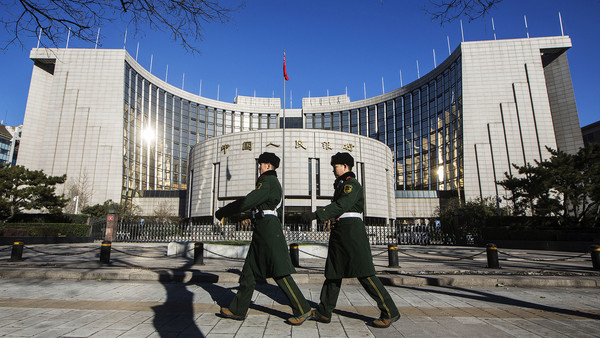
Measures taken by Beijing to stem capital flight proved partially effective in December as China’s foreign exchange reserves continued to fall but at a slower pace than in previous months.
北京采取的遏止资本外逃的措施在12月被证明部分有效,中国的外汇储备继续下降,但速度比前几个月有所放慢。
The central bank announced a lower than expected drop in foreign exchange reserves for last month, which fell by $41bn to $3.01tn. A Reuters poll of analysts predicted a $51bn fall for the month after reserves came down by $70bn in November.
中国央行宣布了低于预期的外汇储备下降,上月下降410亿美元,至3.01万亿美元。此前路透(Reuters)对分析师的调查预测,12月中国外汇储备将下降510亿美元。11月中国外储下降了700亿美元。
The People’s Bank of China has been anxious to slow the depreciation of the renminbi, which fell 6.6 per cent last year against the dollar. But simply selling off dollars to defend the currency has been expensive — reserves in 2016 fell from $3.3tn to just above $3tn.
中国人民银行(PBoC)近来急于减缓人民币贬值;去年人民币兑美元汇率下跌6.6%。但是,用抛售美元来捍卫人民币汇率的做法迄今代价高昂;2016年期间,中国外汇储备从3.3万亿美元下降至略高于3万亿美元。
With an eye on saving reserves, monetary authorities deployed a series of new capital controls at the end of 2016 designed to slow capital outflows.
为节省储备起见,中国货币当局在2016年底出台一系列新的资本管制措施,力求减缓资本外流。
The reserve data came as investors debate the renminbi’s likely direction after a surprise two-day surge wrongfooted China bears betting on further depreciation. Last week the offshore renminbi jumped 2.6 per cent in two days — its biggest-ever two day gain against the dollar since it was introduced in 2010 — while the onshore rate reached its highest level in more than a month.
最新外储数据出炉之际,投资者正在辩论人民币的可能走向,此前人民币出现令人意外的两天涨势,令看跌中国、押注人民币进一步贬值的人士措手不及。上周,离岸人民币汇率在两天里上涨2.6%(这是自2010年推出人民币离岸汇率以来其相对于美元的最大两日涨幅),而在岸汇率达到一个多月来最高水平。
The continued capital outflow heightens the possibility that Beijing will either increase measures to keep cash in the country, such as cracking down on personal exchange limits, or make a one-off devaluation to relieve pressure on the currency.
持续的资本外流加大了两种可能性:一是北京方面将增加把现金留在国内的措施,比如收紧个人购汇限制;二是进行一次性贬值,以减轻人民币所受的压力。
HSBC estimated that the cental bank sold off about $26bn in December in its continued struggle to prop up the flagging renminbi, while $15bn of the drop in the value of reserves was due to a rising dollar. That was lower than in November when $35bn of the decline was due to intervention by the central bank.
汇丰(HSBC)估计,12月中国央行出售了约260亿美元以延续其支撑疲弱的人民币的努力,而外储下降中的另外150亿美元是由于美元走高。这个美元出售数字低于11月,该月有350亿美元的外储下降是由于中国央行售出美元以干预汇率。
The smaller fall in reserves nonetheless showed that pressure on the renminbi continues, as many Chinese people seek to get money out of the country.
然而,中国外储的较小幅度下降仍表明,随着许多中国人试图将资金转移至境外,人民币仍继续受到压力。
“The regulatory framework has been tightening, thereby taking the pressure off just deploying FX reserves. This means that FX reserves will probably continue to decline but at a slower pace,” said Paul Mackel, head of emerging markets forex research at HSBC in Hong Kong.
“监管框架最近在收紧,从而减轻了消耗外汇储备的压力。这意味着外汇储备很可能继续下降,但速度会放慢,”汇丰新兴市场外汇研究主管保罗?麦凯尔(Paul Mackel)在香港表示。
Beijing began to impose new capital controls in November, including strict limits on large corporate investments abroad, in an effort to close off an avenue widely used to get money out of China.
北京方面从去年11月开始实施新的资本管制,包括对中资企业在境外进行的大笔投资实行严格限制,以求封堵一条被广泛用于转移资金至境外的渠道。
“China’s FX policy has become increasingly defensive in stabilising [renminbi] depreciation pressures over recent months,” said Mr Mackel.
“中国的外汇政策在最近几个月越来越趋向于守势,目的是稳住(人民币)贬值压力,”麦凯尔表示。
The controls have made life complicated for many multinational companies — even routine business operations such as paying dividends abroad have been subject to delays and new scrutiny, according to a report by the EU’s Chamber of Commerce in China last month.
这些控制措施使许多跨国公司的日子变得复杂——根据根据中国欧盟商会(European Chamber of Commerce in China)上月发表的一份报告,就连例行业务操作,比如向境外支付股息,也受到延误和新的审查。
The capital controls also present risks for Chinese companies that helped the renminbi appreciate by borrowing dollars and converting them into the currency, according to Kevin Lai, chief Asia ex-Japan economist at Daiwa Capital Markets.
大和资本市场(Daiwa Capital Markets)的日本以外亚洲首席经济学家赖志文(Kevin Lai)表示,这些资本管制也对之前借入美元资金并将其兑换为人民币、从而推高人民币的中国企业构成风险。
The renminbi appreciated by about 37 per cent over a period of nine and a half years before it began to fall in value against the dollar as companies bought the currency.
人民币曾在9年半时间里升值约37%,但随后就在企业买入人民币之际,这种货币相对于美元的汇率开始下跌。
“These borrowers must be under real pressure now to get out,” Mr Lai wrote in a report. “If they cannot do so because of more capital controls, what will happen to the banks they borrowed the dollars from?”
“这些借款人现在肯定受到摆脱困境的极大压力,”赖志文在一份报告中写道,“如果他们由于资本管制加强而无法脱手美元债务,贷给他们美元资金的银行会发生什么?”


